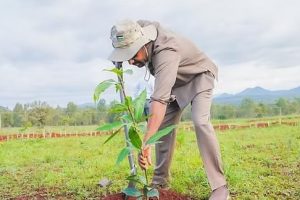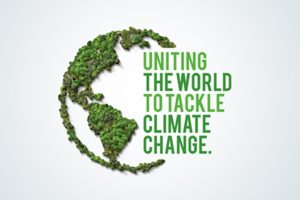BY DARGIE KAHSAY
As a preparation for the upcoming Glasgow climate change conference, which is scheduled to launch on November 01, the Inter Governments Authority for Development (IGAD) climate wing, the IGAD Climate Protection and Application Center (ICPAC) organized a webinar discussion on Thursday entitled “COP 26: African Negotiations and East African Priorities.”
Presenting Ethiopia’s experiences and efforts of tackling climate change and the expectations that developing countries especially needs from the COP 26 session in Glasgow, Ethiopian Environment, Forest and Climate Change Commission Commissioner Professor Fekadu Beyene stated that during the webinar said that the world is at the critical stage due to climate change and needs urgent decisions to increase the actions on climate change.
Professor Fekadu argued that the world is experiencing huge damages and losses due to climate change and the planet is increasingly warming from time to time. Hence, he said, the world must act considering the huge and devastating impacts of climate change. “Countries should step up on all fronts to make sure that the 1.5 degree Celsius target on the Paris agreement is within reach,” the Commissioner stated calling all countries to “walk the talk” and to keep the promises.
Since the world decision-makers are expected to gather at the upcoming Glasgow climate conference, where the highest decision-makers on climate are participating, Professor Fekadu underlined that “countries should not leave Glasgow without a concrete decision on enhancing climate ambitions and climate finance among others” so as to save the world from further damages and losses.
“We expect all countries from all corners of the world to join the Glasgow conference with high ambition for concrete outcomes on the critical issues related to climate change.” Commissioner Fekadu noted. He said that enhancing ambition, adaptation, climate finance, market mechanism and transparency mechanisms on climate action needs strong implementation mechanisms during the upcoming climate change conference, the COP 26.
Unless strict decisions are passed during this historic conference, the devastating damages of climate change will continue and the suffering of the world would worsen. The weakness and limitations of appropriate actions today may lead to irreversible levels and it is time to invest the maximum capacity of the world resources to save the world.
Professor Fekadu argued that regarding enhancing ambitions; “parties must not leave Glasgow without filling the previous ambition and promise gaps to limit the world’s temperature to 1.5 degree Celsius goal. In this regard, he said, big emitters must reduce emissions and COP 26 must give assurance that this can happen.”
According to the commissioner Ethiopia’s contribution to the global greenhouse gas emission is minimal, “currently estimated at 0.04 per cent”, but Ethiopia is highly vulnerable to the impacts of climate change. Due to Ethiopia’s high dependence on rainfall agriculture, natural resources as well as its relatively low adaptive capacity, Ethiopia is experiencing huge impacts of climate change, he noted.
The impact of climate change and vulnerability of Ethiopia according to the commissioner is already being experienced in almost all sectors with different intensities across the country. “Cognizant of this fact,” the commissioner stated, “Ethiopian Government has vision achieving structural transformation and building climate resilience green economy since 2011.” The vision is embedded across the policy and planning efforts, he stated.
Professor Fekadu also noted that Ethiopia has submitted its revised national determined contribution (NDC) in July 2021 with a commitment to control and limit its emission contribution. But, for him, the developing countries efforts are conditional on the supports of the developed world. Ethiopia has also developed its national adaptation plan (NAP) in 2017 in order to implement the NAP and setout roadmap and NAP Ethiopia resource mobilization strategy between 2018 and 2020, he added.
He said that Ethiopia was submitted the NDC in 2015 to reduce emissions from all sectors by 64 per cent by 2030 by the business as usual scenario. Ethiopia submitted its updated NDC in July 2021 committed to a 68.8 per cent reduction below the business as usual scenario conditional on international support. This target includes an unconditional component of 14 per cent reduction below business as a usual scenario which Ethiopia will undertake with its own resources, he noted.
With the combined efforts of conditional and unconditional contributions, Ethiopia plans to reduce 68.8 per cent of emissions, which is around 270.7 million metric tons of carbon die oxide in 2030, the commissioner reiterated.
Ethiopia’s NDC, according to commissioner Fekadu, has identified specific mitigation actions to reach the net-zero plan. Interventions in sustainable agriculture, reforestation initiatives, energy transmission and efficiency, developing agricultural mechanization and increasing share of mass transport, increasing share of electric mobility are among the planned mitigation actions to meet the net-zero plan, he added.
Commissioner Fekadu underlined that to reach the net-zero targets in Ethiopia; the updated financial cost of the NDC is 316 billion USD with mitigation cost accounting 276 billion USD, between 2021 and 2030, of which around 87 per cent goes to the mitigation cost. He said that all developing countries have similar limitations, especially in finance and technology for the proper implementations of the planned targets. Hence, he said, financial funds and other supports to the developing world from the high emitters is a must.
African Group of Negotiators Experts Support (AGNES) Team Leader, Dr George Wamukoya on his part during the webinar stated that COP 26 is highly political similar to the COP 21 in Paris and the COP 15 in Copenhagen. According to him, the heads of states and governments have been invited and are close to rallying all the truth to an outcome and similarly, agenda items will be finalized by ministers. Hence, further decisions are expected from the Glasgow conference on climate change and Africa should prepare to protect Africa’s interests.
According to George, Africa’s priorities during the upcoming climate conference are adaptation, resilience and loss and damage, NDC ambition, special need and circumstance, climate finance and common time frame. In addition, enhancing transparency framework, bringing outcomes on agriculture out of the negotiation and the Kyoto protocol are the priority agendas that African negotiators should give attention to during this session, he added.
George stated that the recent Intergovernmental Panel on Climate Change (IPCC) report is a wake-up for Africa to take appropriate actions on climate change. The continent’s NDC ambition must be developed from its current low level, he said.
“Africa is on around trajectory,” Dr. George said adding, “science tells us that we have only limited time to turn around” to limit the framework to 2 degrees or 1.5 degrees Celsius. Focusing on the adaptation agenda is also the priority for Africa according to the team leader. “In the Paris Agreement, the adaptation goal is voluntary,” George stated adding “but, for Africa adaptation is the priority area and any effort to deal with how to enhance adaptation capacity, climate resilience and reduce vulnerability to climate change is a priority agenda.”
Putting Africa on the same level as NDCs is also a top Agenda of the continent. This requires special negotiation to deal with and provide a proper narrative of evidence he argued. Promoting cooperative approaches, non-compromising of climate action and identifying the comparative advantages should get attention from the African countries.
Finance is the key resource in climate action, the team leader argued. The developing countries should get adequate financial access for the proper implementation of their promises on climate action. Almost all countries have updated their NDCs in Africa,” he noted adding making available financial access would help the countries to effectively apply the prepared promises in the NDC. The world should make available the 100 billion USD finance promise for climate action so as to make effective the struggle against climate change.
The Ethiopian Herald October 24/2021





